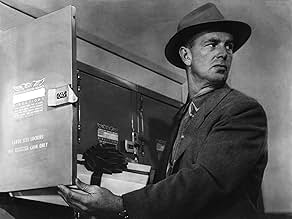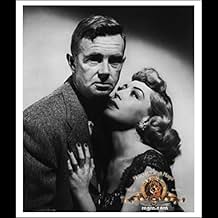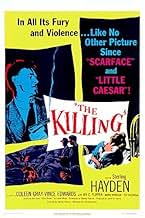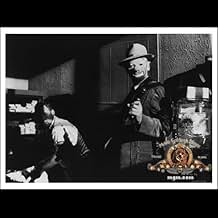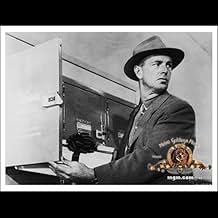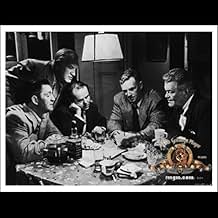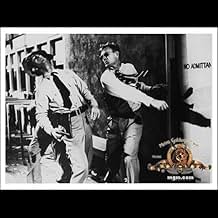Johnny Clay stellt ein Fünf-Mann-Team für einen gewagten Raubüberfall auf der Rennstrecke zusammen.Johnny Clay stellt ein Fünf-Mann-Team für einen gewagten Raubüberfall auf der Rennstrecke zusammen.Johnny Clay stellt ein Fünf-Mann-Team für einen gewagten Raubüberfall auf der Rennstrecke zusammen.
- Regie
- Drehbuch
- Hauptbesetzung
- Nominiert für 1 BAFTA Award
- 1 Nominierung insgesamt
Ted de Corsia
- Patrolman Randy Kennan
- (as Ted DeCorsia)
Elisha Cook Jr.
- George Peatty
- (as Elisha Cook)
Joe Turkel
- Tiny
- (as Joseph Turkel)
Empfohlene Bewertungen
Stanley Kunbrick was still in his twenties when he made this film, yet his confidence and self-assurance are all over it. It is a well-written story, co-written by Kubrick (based on a novel called "A Clean Break"), about a meticulously planned horetrack heist told from the point of view of the several people who were in on the plot. Most of these guys weren't professional criminals, but otherwise honest men who were down on their luck and needed a break. They turned to this audacious plan in desperation, thinking they could do some real good in their lives with their share of the money. I won't give away the ending of course, but keep in mind this is a Kubrick film. That's all I say about that.
Standouts include Sterling Hayden as the ringleader, Marie Windsor as a snide, manipulative woman, Elisha Cook as her milquetoasty husband, Timothy Carey, as creepy as ever, and Kola Kwariani, the thinking man's Tor Johnson, as a chess expert/hired thug.
Speaking of chess, this is the first movie I've ever seen with a scene taking place in a chess parlor. Being from a provincial New England town, and not being a chess afficionado, I never knew such places existed.
Standouts include Sterling Hayden as the ringleader, Marie Windsor as a snide, manipulative woman, Elisha Cook as her milquetoasty husband, Timothy Carey, as creepy as ever, and Kola Kwariani, the thinking man's Tor Johnson, as a chess expert/hired thug.
Speaking of chess, this is the first movie I've ever seen with a scene taking place in a chess parlor. Being from a provincial New England town, and not being a chess afficionado, I never knew such places existed.
Stanley Kubrick's coming-out party from the mid '50s is a startlingly accurate prediction of film's future. By way of a non-linear narration and a few remarkably fresh transitions, Kubrick adds considerable weight and magnitude to a tangled heist tale and its focus on the crooks behind a slick, daring stickup of the local racetrack. Confused by the film's radical new approach to storytelling, test audiences hated the first cut, leading to studio meddling and an almost-complete disintegration of its marketing budget. Kubrick fought back, though, and with the obvious exception of a horribly heavy-handed deadpan narration, the finished product seems virtually untouched. Concerned mostly with the planning and hand-wringing before the big theft, The Killing tensely builds anticipation throughout before finally boiling over in a machine gun-paced robbery scene, terse payoff and all-too-brief elaboration on the major players' ultimate fates. Acceptably acted at best, the real stars of this picture are the complex plot and the harvest of fresh ideas going on behind the lens. A clear inspiration for Tarantino's big hits of the '90s, it's a daring and stylish major market debut for the famed director that hints at the lengths his development would ultimately take the medium.
There is a plan that just can't fail no matter what, take the racetrack's banked cash roll, take all it's got, everybody knows their place, where to be for the big race, then where to gather, to take their share, of the big pot.
A piece of cinema magic that to this day leaves you astounded at the brilliance of the writer/director, amazed at the sensational performances by some truly great actors, and as engaged as you could ever hope to be with a story that nestles nicely in the age and the era from which it was born, an accomplishment that so many films of that time fail to achieve when revisited.
A piece of cinema magic that to this day leaves you astounded at the brilliance of the writer/director, amazed at the sensational performances by some truly great actors, and as engaged as you could ever hope to be with a story that nestles nicely in the age and the era from which it was born, an accomplishment that so many films of that time fail to achieve when revisited.
Although Jack Palance and Victor Mature would have been perfectly good in the lead role I was surprised that Sterling Hayden was a third choice after them to play the lead in The Killing. Given his performance in The Asphalt Jungle I would have thought Hayden would have been a first choice for fledgling director Stanley Kubrick.
Hayden was in the muscle end in The Asphalt Jungle, but in The Killing he's doing some planning as well. What he's got planned is an intricate robbery of a racetrack with crooked cop Ted DeCorsia, track bartender Joe Sawyer, Jay C. Flippen, and parimutuel clerk Elisha Cook, Jr. Each has a most specific job that is timed to the split second. In addition Timothy Carey and Kola Kwariani have some jobs to perform that are unknown to the others and are getting a flat fee off the top for what they do.
Cook hasn't got his head in the game though. Who would with two timing high maintenance dame Marie Windsor as a wife. She learns enough to tip her boyfriend Vincent Edwards off to the scheme. Coleen Gray has the Jean Hagen role as Hayden's loyal girl friend.
The robbery comes off pretty good, the scenes are done in the same manner as The Asphalt Jungle. Of course the usual problems involving the split and the getaway occur. A lot of that is taken from The Asphalt Jungle as well.
The film was shot in and around Bay Meadows racetrack so it looks very real. Stanley Kubrick got such good reviews for this and deservedly so that Kirk Douglas hired him to direct the much bigger budgeted Paths of Glory. A career was born.
The Killing is a finely edited and finely crafted piece of movie making. It's both a noir and a caper film and succeeds at both. The characters are realistic in a realistic setting. Everybody here can be proud of their participation.
Hayden was in the muscle end in The Asphalt Jungle, but in The Killing he's doing some planning as well. What he's got planned is an intricate robbery of a racetrack with crooked cop Ted DeCorsia, track bartender Joe Sawyer, Jay C. Flippen, and parimutuel clerk Elisha Cook, Jr. Each has a most specific job that is timed to the split second. In addition Timothy Carey and Kola Kwariani have some jobs to perform that are unknown to the others and are getting a flat fee off the top for what they do.
Cook hasn't got his head in the game though. Who would with two timing high maintenance dame Marie Windsor as a wife. She learns enough to tip her boyfriend Vincent Edwards off to the scheme. Coleen Gray has the Jean Hagen role as Hayden's loyal girl friend.
The robbery comes off pretty good, the scenes are done in the same manner as The Asphalt Jungle. Of course the usual problems involving the split and the getaway occur. A lot of that is taken from The Asphalt Jungle as well.
The film was shot in and around Bay Meadows racetrack so it looks very real. Stanley Kubrick got such good reviews for this and deservedly so that Kirk Douglas hired him to direct the much bigger budgeted Paths of Glory. A career was born.
The Killing is a finely edited and finely crafted piece of movie making. It's both a noir and a caper film and succeeds at both. The characters are realistic in a realistic setting. Everybody here can be proud of their participation.
There's little to fault in Stanley Kubrick's classic robbery tale. The acting is first-rate with Marie Windsor, as Mrs. Peaty, a sarcastic stand-out. The story just pops off the screen - and at less than 90 minutes, there's literally no filler. I love the winding time line ("earlier that day" etc.), which has been liberally utilized by Quentin Tarantino (Jackie Brown, Pulp Fiction, Reservoir Dogs). This film was made right before Kubrick's WWI marvel, Paths of Glory, and his genius is apparent in both. No wasted words or actions. Love that last line!
Wusstest du schon
- WissenswertesInitial test screenings were poor, citing the non-linear structure as the main problem. Stanley Kubrick was forced to go back and edit the film in a linear fashion, making the film even more confusing. In the end, it was released in its original form, and is often cited as being a huge influence on other non-linear films like Reservoir Dogs - Wilde Hunde (1992) and Pulp Fiction (1994).
- PatzerDuring the robbery, it's clear that a significant amount of the money is in neatly banded bundles of crisp brand-new bills, yet when it's transferred from the duffel bag to the suitcase, all the bills are loose, unstacked, and appear well-used.
- Zitate
Johnny Clay: You'd be killing a horse - that's not first degree murder, in fact it's not murder at all, in fact I don't know what it is.
- VerbindungenEdited into Hai-Kubrick (1999)
Top-Auswahl
Melde dich zum Bewerten an und greife auf die Watchlist für personalisierte Empfehlungen zu.
Details
- Erscheinungsdatum
- Herkunftsland
- Sprache
- Auch bekannt als
- Casta de malditos
- Drehorte
- Produktionsfirma
- Weitere beteiligte Unternehmen bei IMDbPro anzeigen
Box Office
- Budget
- 320.000 $ (geschätzt)
- Weltweiter Bruttoertrag
- 380 $
- Laufzeit
- 1 Std. 24 Min.(84 min)
- Farbe
Zu dieser Seite beitragen
Bearbeitung vorschlagen oder fehlenden Inhalt hinzufügen


